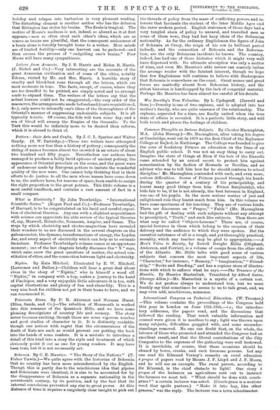Common Thoughts on Serious Subjects. By Chester Macnaghten, M.A. (John
Murray.)—Mr. Macnaghten, after taking his degree at Cambridge, went out in 1870 as the first Chief of the Rajkumar College at Rajkot, in Kathiaw§r. The College was founded to give the sons of feudatory Princes an education on the lines of an English public school. It was not an easy thing to carry out. Imagine the state of things at Eton if the heir of the Russells came attended by an armed escort to protect him against assassination by the faction of Howards or Nevilles, and an adviser who was to tell him how far he should conform to school discipline ! Mr. Macnaghten contended with such, and even more, serious difficulties. Scores of Princes passed through his hands during the quarter of a century of his principalship, and learnt many good things from him. Prince Ranjitsinhji, who bids fair to be, if he is not already, the best batsman in England, was one of his pupils. In the more serious matter of just and enlightened rule they learnt much from him. In this volume we have some specimens of his teaching. They are of various kinds. There are discourses on "Prayer," " Faith " (Mr. Macnaghten had the gift of dealing with such subjects without any attempt to proselytise), "Truth," and such like subjects. Then there are what may be called "Object-Lessons." There are, of course, special features in them which belong to the occasion of their delivery and the audience to which they were spoken. But the essential substance of all is a rough, and yet thoroughly practical, morality, which any teacher may be glad to appropriate.—A Man's Value to Society, by Newell Dwight Hillis (Oliphant, Anderson, and Ferrier), is a volume of essays from the other side of the Atlantic. Mr. Hillis talks with good sense of various subjects that concern the most important aspects of life, "Character," for instance, "Memory," "Imagination," "Friend- ship," "Books and Beading," and has a copious store of illustra- tions with which to enforce what he says.—The Treasure of the Humble. By Maurice Maeterlink. Translated by Alfred Sutro. (George Allen.)—Mr. Maeterlink is a mystic of a certain sort. We do not profess always to understand him, but we must frankly say that sometimes he seems to us to talk great, and, we may even add, mischievous, nonsense.






















































 Previous page
Previous page